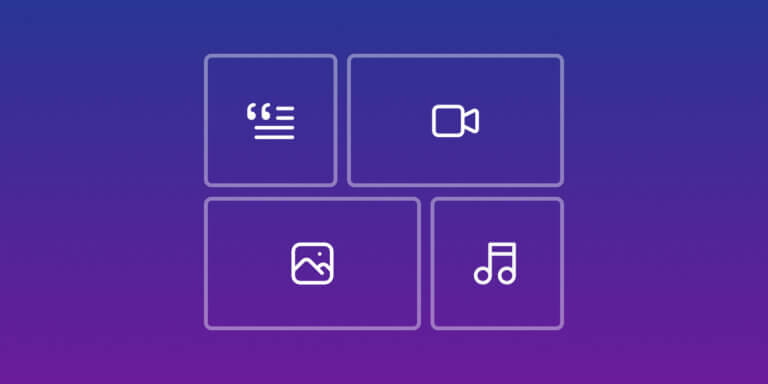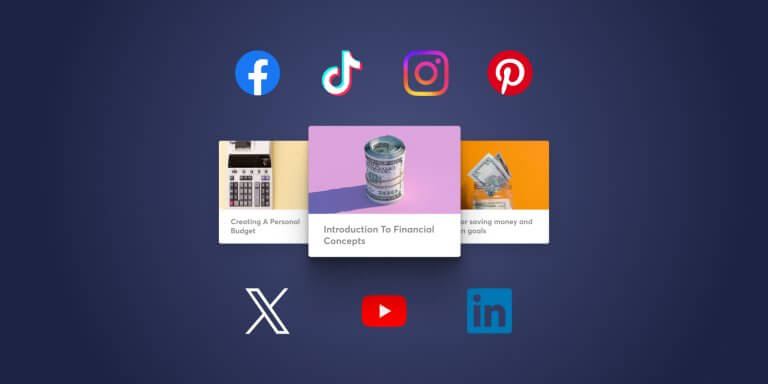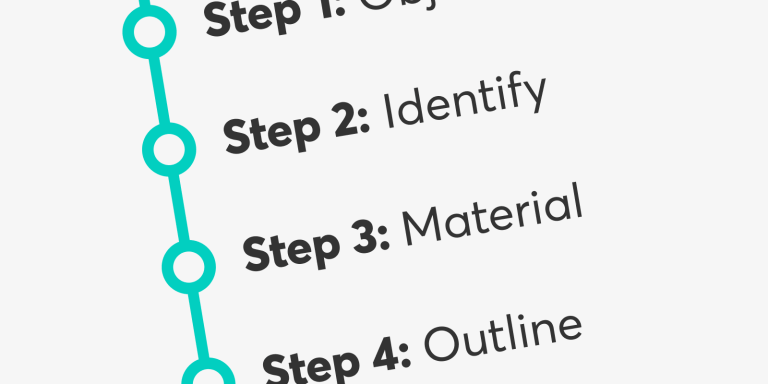Table of Contents
Ever thought your course content could work harder for you? Like a team member who never clocks out? Welcome to the world of content licensing, where your educational materials can reach new audiences, build your brand’s credibility, and even create passive income.
Imagine universities, corporations, and other organizations using your content to train their audiences (customers, employees, stakeholders, etc) or educate their students, all while you earn. Content licensing is the secret superpower that can turn your intellectual property into a growth machine, helping you amplify your reach without lifting a finger.
In this article, we’ll break down everything you need to know about content licensing. You’ll learn how to turn your content into an asset, how to craft agreements that protect your rights, and the benefits of seeing your content make an impact across industries.
Get started and find out how content licensing can take your content and business to new levels.
What is content licensing?
Content licensing is the legal permission to use copyrighted material – text, images, videos, music, or software – under specific terms for specific uses.
By licensing content, creators retain control over their intellectual property while allowing others to use it, expanding the content’s reach without infringing on copyright laws.
For businesses and educators, licensing is gold dust as it allows controlled use of intellectual property, protects ownership rights, and turns passive content into a revenue-generating asset.
A license agreement should clarify permissions, define usage terms, and establish compliance guidelines, so everyone is clear on what’s what.
A legal contract is essential in content licensing as it formalizes the agreement and clearly defines the terms and conditions to protect the legal ownership of the content.
By signing a content license agreement, organizations can use and distribute the licensed content, comply with intellectual property laws, and avoid legal issues.
Understanding ownership is key as these legal contracts govern the rights of intellectual property, outlining how rights holders grant permission to third parties to use the content in exchange for payment.
Definition of content licensing
Content licensing means getting legal permission to use copyrighted material – text, images, videos, music, or software – for a specific use, time, and within certain terms and conditions. This permission is given by the copyright owner to a third party to use the content without infringing on copyright laws or intellectual property rights.
By signing a content license agreement, organizations can use and distribute the licensed content, comply with intellectual property laws, and avoid legal issues.
What’s intellectual property in content licensing?
Intellectual property (IP) is key in content licensing to ensure original content creators and owners are protected and paid for their work. IP rights including copyrights, trademarks, and patents give creators control over how their content is used, distributed, and reproduced.
In the context of content licensing, IP rights determine the terms and conditions of the license including scope of use, duration, and territorial restrictions.
By defining these terms, content creators can protect their intellectual property and allow others to benefit from their work under agreed conditions.
Why license your course content?
Licensing content is beneficial to businesses, educators, and course creators. By licensing your content you can expand your reach so it’s accessible to new audiences, such as universities or corporate training programs, which can amplify your brand visibility and credibility.
Plus licensing creates additional revenue streams.. Effective licensing not only protects intellectual property but also broadens audience reach and as a result contributes to revenue growth.
Through royalties or flat fees in a license agreement, creators can turn existing content into a passive income. Successful course creators for example have expanded their audience significantly by licensing training materials to corporations, generating passive income while building brand reputation.
As well as revenue and reach, licensing helps establish and build your brand trust. When organizations use your content it reinforces your position as an authority and builds credibility with current and prospective audiences.
Licensing agreements allow organizations to republish brand-related articles and other media provided by third parties, increasing brand visibility and revenue streams through repurposing existing content.
Benefits of content licensing
Content licensing benefits both creators and users. For you as a creator, licensing your content can generate a new income stream, increase your audience reach, and build your brand reputation.
By licensing your content you can monetize your existing assets through royalties or flat fees and turn passive assets into active income streams. Plus licensing allows you to expand your reach by making your content available to new audiences, such as educational institutions or corporate training programs, and amplify brand visibility and credibility.
For users, licensing content can save time and resources, provide access to high-quality content and help establish their brand as a thought leader in their industry.
Licensed content can be a cost-effective solution for organizations looking for comprehensive learning materials without having to create content from scratch.
Additionally, content licensing can facilitate collaboration and innovation as it allows users to build upon existing content and create new and original works, fostering a culture of continuous improvement and creativity.
What are content licensing agreements?
A content license agreement is a legal contract that outlines the terms under which the content can be used. These agreements are critical for managing permissions, setting payment terms, and defining usage restrictions.
Proper permission to use the content is key to compliance with the license terms and avoiding copyright infringement. Within a content license agreement, key elements include exclusivity clauses, usage rights, payment terms, and conditions for renewal.
For example, the agreement should clarify if the license is exclusive or non-exclusive and detail payment terms whether one-time fees or ongoing royalties.
Also, it’s important to specify copyright and intellectual property rights to ensure the creator’s ownership is protected and the licensee has clear boundaries to use the content.
Types of content licensing agreements
There are several types of content license agreements, each with its own terms and conditions:
Types of content you can license
Licensed content comes in various formats, including text, images, video, audio, and interactive media.
Text content such as articles, ebooks, and training modules can be licensed for educational or training purposes.
Visual content like images and graphics as well as engaging video and audio materials such as tutorials or podcasts often reach diverse audiences effectively.
Interactive media and software add another layer, offering modern and dynamic learning experiences.
Each content type requires specific permissions to avoid copyright infringement and ensure that both the creator’s rights and the licensee’s uses are safeguarded. Content licensing allows for distribution across various platforms, enabling organizations to repurpose or redistribute content across different mediums and channels, hence broadening their distribution scope and engaging a wider audience.
Crafting a content licensing strategy
Developing a strategic approach to content licensing can maximize both your reach and revenue. The first step is to define licensing goals. Are you looking to generate revenue, brand exposure, or a mix of both?
Defining these goals helps to set the right terms. Once goals are established, setting clear terms for intellectual property use is crucial. These terms should include any restrictions or conditions for permitted uses, so your content remains aligned with your brand’s image and standards.
Monitoring compliance is another key aspect of a successful licensing strategy. Regularly reviewing how licensees use your content and maintaining open communication can prevent misuse and uphold the integrity of your brand’s assets.
A well-structured licensing program with compliance tracking tools can simplify these processes, allowing creators to manage agreements efficiently.
Creating a content licensing agreement
Creating a content license agreement requires careful consideration of several key elements to ensure clarity and protect the rights of both parties.
A well-structured content license agreement should include the following components:
Essential elements of a licensing agreement
By including these elements, a content license agreement can provide a clear framework for the use and distribution of copyrighted material, protecting the rights of creators and users.
Marketing licensed content to organizations
To market licensed content, target institutions that value high-quality training materials, such as universities, corporations, and educational providers.
Craft a targeted approach that highlights your content’s value to these organizations and republish licensed content on your company blog to engage audiences and increase brand visibility and customer retention.
Also leverage your existing audience for cross-selling opportunities by educating your customers about licensing options through newsletters, webinars, and social media channels to build engagement and interest.
For organizations that need content at scale, focus on the flexibility and cost-effectiveness of licensing agreements that support bulk use. This appeals to large institutions looking for comprehensive learning solutions while giving you the benefit of long-term partnerships.
Legal considerations in licensing
Content licensing and intellectual property require an understanding of copyright law to avoid infringement. Following copyright law is key as it’s the framework within which content can be licensed.
Licensing gives legal permission to use copyrighted material, protects content creators, and ensures compliance with intellectual property rights and copyright laws.
Using Creative Commons licenses offers a flexible way to share content without relinquishing all control, which can encourage collaboration and maintain essential rights.
Getting permissions is just as important to ensure both the content creator and the licensee are protected under clear terms, to avoid misunderstandings and potential legal disputes.
The future of content licensing
Content licensing opens up opportunities to reach new audiences and generate steady income, for organizations and creators to scale their impact in the education and training space.
Licensing content is key in the digital world. It offers many benefits and addresses legal complexities to protect intellectual property while maximizing reach and revenue.
Platforms like LearnWorlds offer the flexibility and scalability to license seamlessly, adapt to different business needs, and support growth.
FAQs
1. What types of content can be licensed?
Text, images, videos, and software are among the content types that can be licensed for educational and commercial use. A content licensing agreement is a legal contract that outlines the terms and conditions of content use, to protect intellectual property and allow legitimate repurposing or redistribution of content.
2. What benefits does licensing offer?
Licensing increases reach, builds credibility, and generates income, it’s a versatile tool for content creators and organizations.
3. How do I avoid copyright infringement in licensing?
Follow copyright law, define terms clearly in agreements, and monitor to ensure compliance.
Further reading
- 17 Innovative Business Models for Monetizing Your Online Academy
- The 3 Most Lucrative Offerings to Grow Your Course Business & Create a Rich Learning Ecosystem
- Mastering the Basics: Understanding Revenue Streams & Marketing Tools to Drive Your Success
- How to Make Money as an Affiliate for eLearning Products
- Knowledge Economy: How to Sell Knowledge Online
- How Much Money Can You Make Selling Online Courses?
Rosemary is LearnWorlds’ Content Marketing Manager. She has over 2 decades of experience in omnichannel marketing and content writing for the IT and SaaS industry. Her expertise lies in crafting effective content marketing strategies that attract, engage, and nurture customers, enabling LearnWorlds to reach its target audiences with precision.





